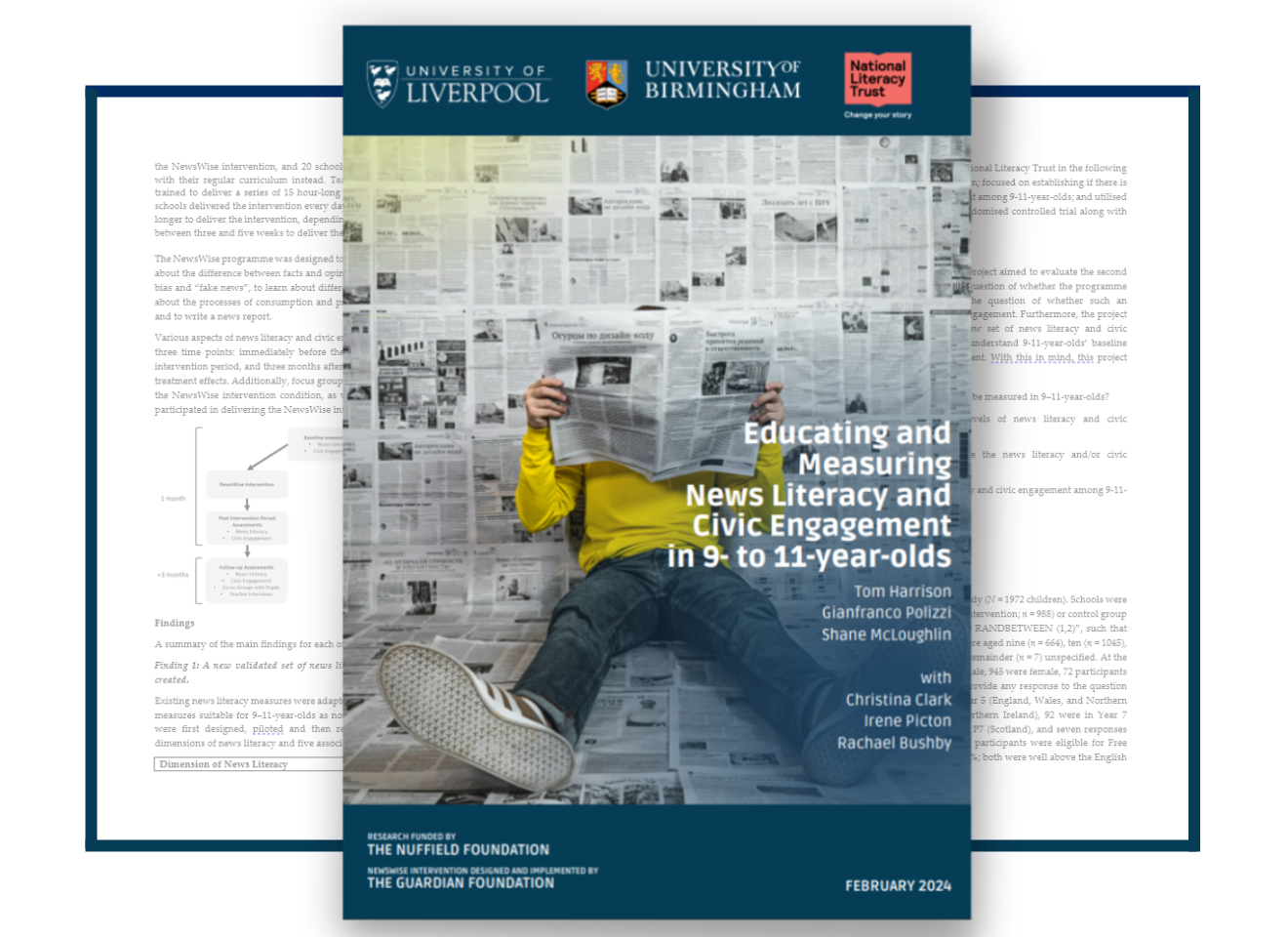Project Funder: The Nuffield Foundation
Project Overview
This project was an investigation of news literacy and civic engagement in 9-11-year-olds in the UK. It also included an evaluation of the impact of NewsWise, a news and digital literacy programme. This project was undertaken in collaboration with NewsWise, The Guardian Foundation, the National Literacy Trust and the PSHE Association.
The aim of the project was to contribute to a generation of children who are better equipped to participate in society as well-informed citizens.
Key Findings
The report was published in February 2024, and the key findings were as follows:
- A new validated set of news literacy measures, suitable for 9- to 11-year-olds, was created.
- A new validated set of civic engagement measures, suitable for use with 9–11-year-olds, was created.
- 9–11-year-olds in the UK believe the news should be truthful and balanced, but less than half know how to spot fake news and only three in ten are interested in the news.
- 9–11-year-olds in the UK have extremely positive attitudes towards civic engagement. Five in ten, however, think that they will vote when they grow up, and only 35% talk about politics and social issues with their parents.
- The NewsWise programme improved 9-11-year-olds’ ability to detect fake news and this improvement sustained over time.
- Qualitative analysis found many benefits of the NewsWise programme as well as areas for improvement.
- A strong positive relationship between news literacy and civic engagement among 9-11-year-olds was found for the first time.
Key findings are explored in more detail within the executive summary, which is freely available to download here:
News Literacy and Civic Engagement Executive Summary
A detailed long-form project report can be found here:
News Literacy and Civic Engagement Full Report
Visit the NewsWise website, here.
Background
Fake news and online misinformation fuels public mistrust in institutions and undermines democracy, which relies on a well-informed citizenry that is able to evaluate the validity of news and information. Such an ability requires lifelong skills and knowledge – referred to as news and digital literacy.
However, many children, especially those from socio-economically disadvantaged backgrounds, often lack the ability to distinguish truth from fiction online, and the skills to critically evaluate online sources. At the same time, lower socio-economic status (SES) backgrounds are less likely to engage with their children about news, and lack confidence in their ability to identify fake news. Growing research shows that school interventions based on delivering news and digital literacy programmes contribute to pupils’ ability to evaluate information and, in turn, to their civic engagement. Civic engagement in this respect is understood as involvement, and/or the intention to participate, in community and/or political life.
NewsWise is a UNESCO-awarded UK cross-curricular news literacy programme for 9-11-year-olds running since 2018. NewsWise was created to teach children the skills to autonomously and critically evaluate information found online. By bringing together experts in news and digital literacy, journalism, and Personal, Social, Health and Economic (PHSE) education; the NewsWise programme uses resources and activities to educate children about how news is created and disseminated, as well as to deconstruct and analyse news to be able to identify bias and misinformation.
Over a two-year period, 2,400 9–11-year-olds from 80 primary schools across the UK will experience the NewsWise programme. A team of researchers from the Universities of Birmingham and Liverpool, supported by researchers from the National Literacy Foundation, will evaluate the impact of the programme on UK primary school children’s news and digital literacy and civic engagement. A Randomised Clustered Controlled Trial and interviews will be utilised in combination to evaluate which features of the programme increase 9–11-year-olds news and digital literacy and civic engagement and contribute to a generation of children who are better equipped to participate in society as well-informed citizens. The project is expected to have a significant impact on research and practice through the discovery new knowledge about how best to educate children to develop news, media and digital literacy skills. This knowledge is particularly important given the rise in fake news and misinformation and the interest in policies to address these concerns such as initiatives run by the Department of Culture, Media and Sports (DCMS) and the Online Safety Bill. Over the two years the partners will organise webinars, conferences and publish journal articles, blogs and media publication to share the findings from the project with different audience. The long-term aim of Becoming NewsWise is that it will lead to a new generation of children who are better equipped to participate in civic life.
Further Information
The Nuffield Foundation’s page is available to view here. The NewsWise page is accessible here.
For more information on the project, please contact:
– Professor Tom Harrison, PI; Dr Gianfranco Polizzi, Co-I.
Blogs
Factivism: Exploring the vital link between news literacy and youth civic engagement
Exploration, confirmation, transformation: the value of evaluating news literacy
Successfully engaging schools with a news literacy project
Research Briefings
Educating News Literacy Briefing
How to Measure News Literacy Briefing
News Literacy and Civic Engagement Briefing
Publications
Measuring Civic Engagement in Young Children
News Literacy and Civic Engagement Full Report
News Literacy and Civic Engagement Executive Summary
Survey and Trial Protocol
Survey about the News and Your Community
NewsWise in Primary Education: Evaluation Trial Protocol


